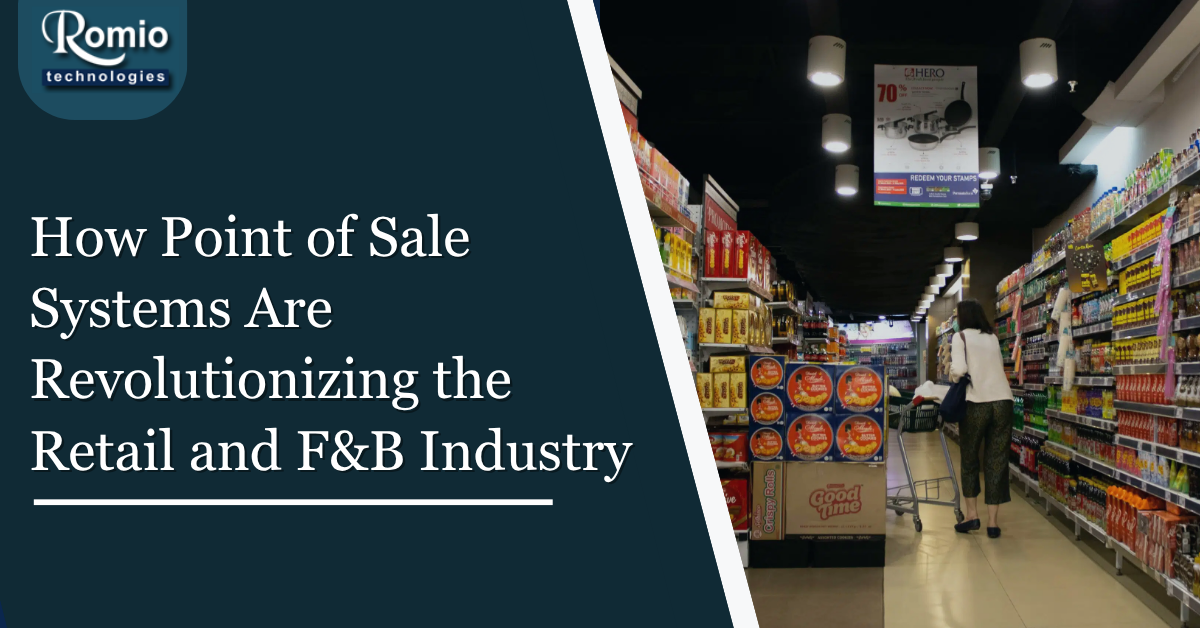
How Point of Sale Systems Are Revolutionizing the Retail and F&B Industry
A point of sales machine is no longer a tool for billing these days, this is a new complete business management system that needs to be followed. In todays competitive scenario, efficient point driving of sales systems is necessary to manage inventory and provide a better customer experience in retail and food and drinks (F&B) areas.
With digital changes and rapid development of customers expectations, businesses cannot rely on the old system. Whether you are running a chain of restaurants, a boutique, or a cafe, an advanced POS system is now the digital heartbeat of your operation.
In this blog, we will get to know about how point of sale machines have developed technically, their major advantages, and why businesses around the world are embracing this technology to streamline and promote profitability to their businesses.
What does a Point-of-Sale Machine mean?
A point of sale (POS) machine is a hardware and software solution that not only allows a business to process transactions at the point but also allows a purchase to be made. Traditionally, the bill is used to print and accept payment; Modern POS systems do a lot, including inventory tracking, sales analytics, employee management, and customer participation. These systems have become essential for any modern retail or hospitality business, replacing manual methods with automated processes that improve accuracy, speed, and service distribution.
Sales System Development
Over the years, Point of Sale Systems has made massive changes:
Today’s POS systems are intelligent, customizable, and connected, helping businesses run smarter and scale faster.
Key Components of a Modern POS System

A modern POS system generally includes the following core components:
Hardware:
Software:
Whether you choose a cloud-based system or an on-premises setup, a reliable POS is designed to improve day-to-day operations and decision making.
Get To The Benefits of Using the Point of Sale System for Retail
For businesses such as retail, POS systems are necessary not only to improve efficiency but also to increase the shopping experience.
This way:
Track the stock level in real time, get a low-stock alert, and automate reorganizing processes.
Identify top-performing products, peak sales hours, and customer purchase patterns.
Use barcode scanners and integrated payment systems to reduce customer waiting time.
Accept payments without any hassle through UPI, card, wallet, and cash.
Collect customer information to run loyalty programs and individual campaigns.
Track personal sales, shift time, and performance metrics.
POS systems are not just efficiency equipment - they are strategic promoters of customer satisfaction and revenue growth.
Impact of POS Machines in the Food and Beverage Industry

There is a unique set of requirements for restaurants and QSRs (quick service restaurants). A dedicated sales machine sewn for F&B operation provides the following:
Assign the table, manage reservations, and see the status of the table in real time.
Allow servers or customers to place direct orders from a tablet, reduce errors, and speed up service.
Track the home delivery order, assign the delivery staff, and integrate with online food aggregators.
Send orders directly to the kitchen through the digital screen, eliminating the manual order slip.
Design combo food, apply discounts, and excite the checkout efficiently.
These characteristics not only improve operational efficiency but also promote customer satisfaction and loyalty.
POS Software and Cloud Integration
With a cloud-based point of sale system, you no longer need to be physically present to manage your business, everything can be done automatically with the advanced technology. Here’s why businesses are switching to cloud-competent POS -
In a fast-paced business environment, cloud integration provides unmatched scalability and control.
Mobile POS: A Game-Changer for On-the-Go Businesses
The rise of mobile POS systems has enabled businesses such as food trucks, pop-up stalls, and distant retail vendors to accept payments and generate bills when leaving.
Benefits include:
Mobile POS is perfect for modern entrepreneurs who require not only flexibility but also compromising facilities.
Choosing the Right POS System for Your Business
Before investing in a POS, consider the following factors:
| Criteria | Considerations |
|---|---|
| Business Type | Retail, F&B, Salon, Pharmacy, etc. |
| Size of Operation | Single outlet vs. multi-location chains |
| Integration Requirements | With CRM, ERP, and payment gateways |
| Usability | Easy for staff to learn and operate |
| After-Sales Support | Training, installation, and technical assistance |
| Budget | Hardware, software licensing, and upgrades |
conclusion
In summary, it is a requirement for modern businesses that are looking for a scale with ease and efficiency. Whether you operate a high-end restaurant, a retail store, or a cloud kitchen, a smart POS solution simplifies complex tasks and fuels better customer service.
If you are ready to upgrade the infrastructure of your business with a wise POS system, then Romio Technology is your reliable technology partner. With more than a decade of experience in providing end-to-end POS and ERP solutions, India and beyond, Romiotech specializes in helping businesses unlock their complete operating capacity.
